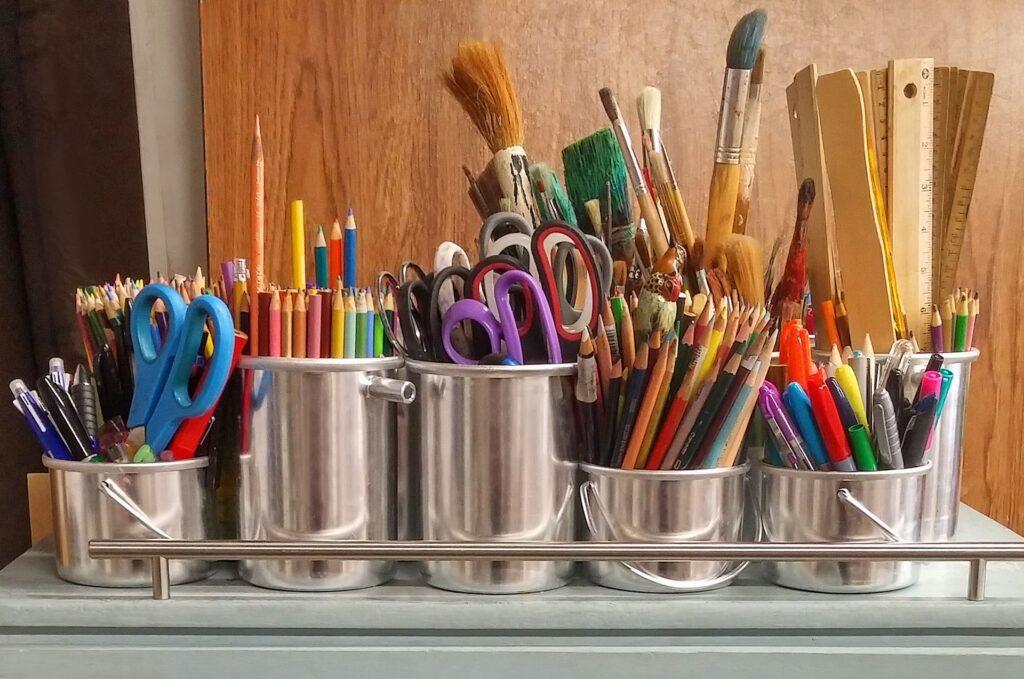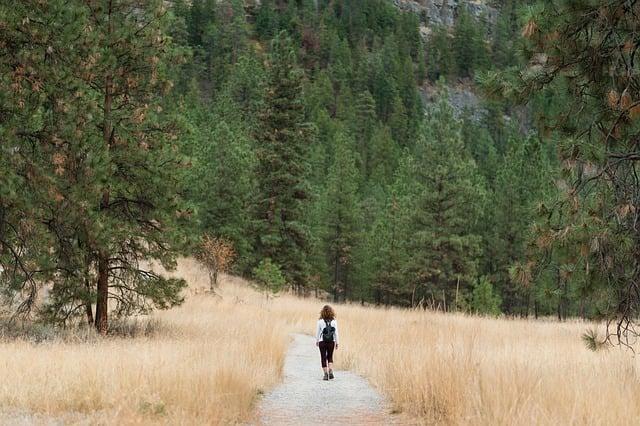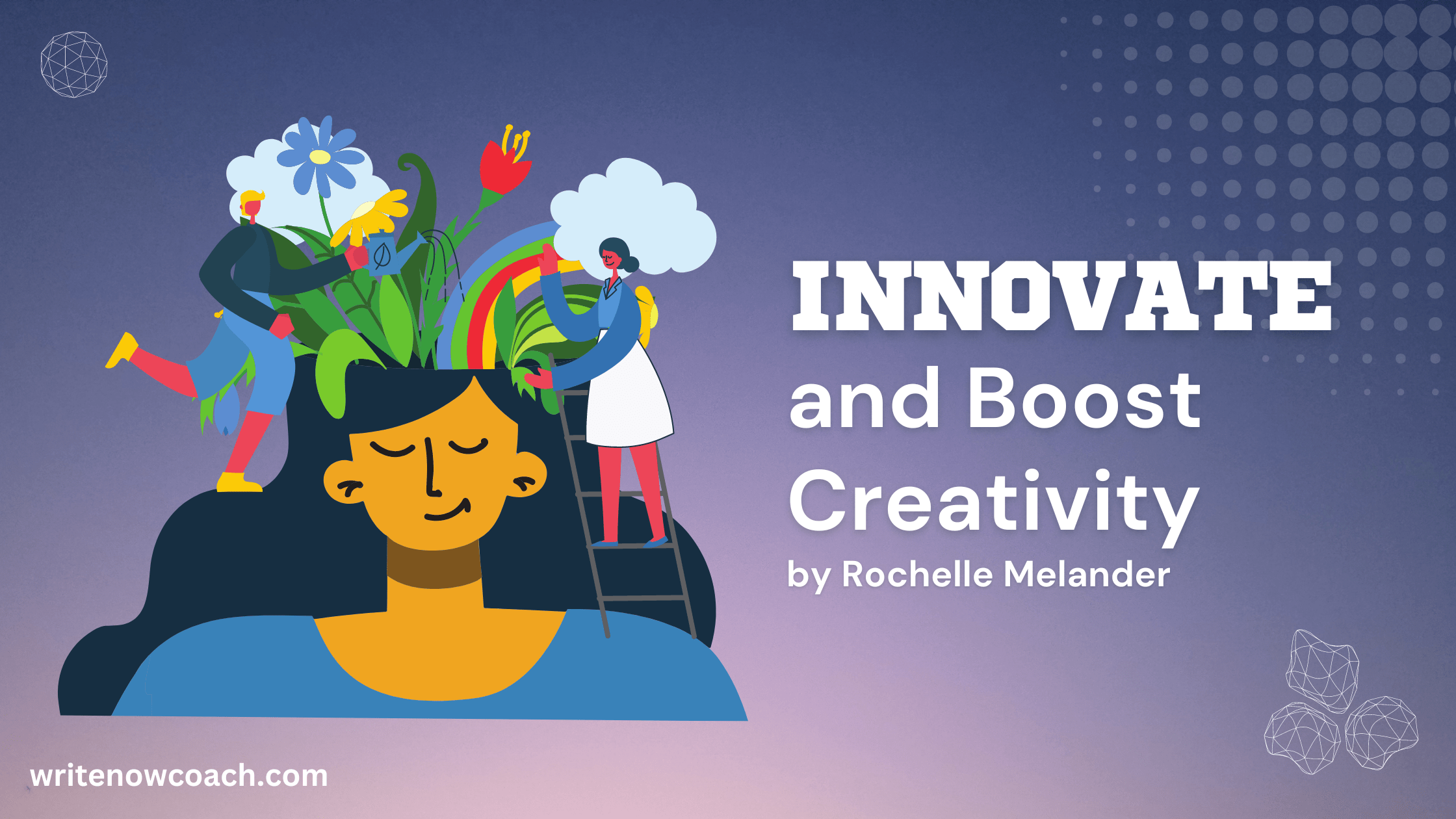Innovate and Boost Creativity
June 20, 2023
Note From Rochelle
Dear writers,
Since January, I’ve revised a novel and written a new one; written and revised several picture books, and written half a dozen poems. I owe my productivity to meeting with my accountability partners every single week. Sharing my weekly goals with them and then having to report on them has helped me stay focused. When I have a bad week, talking to them helps me figure out what happened and make a new plan.
If you’d like that kind of weekly support, sign up for my summer Writing Accountability Group.
We start next Monday and meet for five consecutive Mondays in June and July. During the course of the month, I will cover topics to help you succeed. Those include:
- Create a Writing Productivity Plan
- Overcome Distraction
- Master Mindset
- Overcome Procrastination
- Bust Writer’s Block
Today’s tip is an excerpt from my book, Level Up. When I feel stuck or blocked, it’s time to innovate! This post gives you tips and tools for doing just that!
Happy writing,
Rochelle, the Write Now! Coach
Innovate and Boost Creativity
by Rochelle Melander
If you want something new, you have to stop doing something old.
–Peter Drucker
In the Oprah and Deepak meditation experience called Getting Unstuck: Creating a Limitless Life!, Deepak Chopra said, “It has been estimated that for most people half the thoughts they have today are the same as the ones that they had yesterday.”
Wow.
I wonder:
- How many of our daily thoughts are negative? (Some say up to 70 percent, but I had difficulty finding research to prove that number.)
- How do repetitive thoughts impact our creative life?
- How can we stimulate new thinking?
Creativity is connected to neuroplasticity—the brain’s potential to reorganize itself, creating new neural pathways. According to an article by science writer Brent Crane in The Atlantic:
Neural pathways are influenced by environment and habit, meaning they’re also sensitive to change: New sounds, smells, language, tastes, sensations, and sights spark different synapses in the brain and may have the potential to revitalize the mind.
New experiences stimulate our brain and help us connect ideas, information, and experiences. These new connections can radically affect our creative work. As Steve Jobs said, “Creativity is just connecting things. When you ask creative people how they did something, they feel a little guilty because they didn’t really do it, they just saw something.”
And more good news: when we experience something new, our brain releases dopamine. When our brain releases dopamine, it increases our desire to explore new things and receive a reward. What a lovely cycle! And we can kick it into high gear by purposefully seeking new experiences.
If you’re feeling stuck—mired in repetitive thoughts and habits, not sure how to solve your current creative problem, or confused about how to move forward with your writing project—you might need a dose of newness! This quest will get you out of your comfort zone to experience new things.
The Quest
Here are four proven ways to stretch your brain and spark creativity. Use them as starting points and dream up activities that energize you. Choose one or more to try. Once you’ve played with the experience, reflect on how it impacted your life.
Learn a Craft

A recent study demonstrated that seniors who learned a new skill, like quilting or Photoshop, improved their cognitive function. But the benefits don’t stop there. Repetitive crafts, like crochet, can reduce stress as effectively as meditation. Plus, research shows that crafting can have a dopamine effect, improve our sense of self-efficacy, and reduce our chances of developing cognitive impairment as we age.
Pro Tip: Note that to keep your mind sharp, you just need to learn a new skill. That’s good news for those of you who are craft averse. You can learn to play an instrument, speak Italian, or rebuild a car!
Get outside!

Spending time in nature can boost your creativity in multiple ways. It increases your curiosity and your ability to discover new ideas. It makes your thinking more flexible and open to new ways of thinking about problems. Finally, because it helps you restore your ability to pay attention, being in nature can help you return to work refreshed. Wander in the wilderness, find a park, or park yourself in your yard and engage with the natural world.
Travel

In a study that examined creativity and fashion, the researchers discovered that fashion designers who lived and worked abroad produced more consistently creative work. For those of us who don’t get many opportunities to leave our state let alone the country, we can create the same kind of experience at home. Travel to a new place near you—a small town, a neighborhood or even a new restaurant. When you travel anywhere in your community—by foot, bike, or car—take a new route.
Exercise

We know that exercise boosts creativity and productivity. Art Kramer, a neuroscientist at the University of Illinois, found that just 45 minutes of exercise three days a week increased the volume of the brain. Writers are famous for walking. William Wordsworth composed entire poems on his legendary long walks. Rumor has it that Agatha Christie created her complex plots on long walks with her dogs. Try taking a daily trek in nature or walking around the block between tasks.
Pro Tip: Physical activities that engage proprioception and the cerebellum—like climbing a tree or walking on a balance beam—improve our working memory. Proprioception is our ability to know where a body part is and activate it without having to look. Of course, you can get a similar benefit from trying balancing workouts at the gym or scaling a climbing wall.
Game Play Tips
- Start small. Often, when we try something new, we want to leap to the head of the class. We don’t want to just knit a washcloth, we imagine creating a fancy sweater. When we don’t succeed, we feel like failures—and that can reinforce negative neural pathways. But if we can start with a small step—ten minutes of yoga, a few minutes of balancing exercises each day, knitting a scarf—we can experience success and change our brain!
- Persist past small obstacles. Learning new things can be hard! But the most growth comes when we work to overcome the tiny obstacles, like working to master a difficult measure on the piano. See the practice—and the small obstacles—as a significant and beneficial part of the journey.
- Enlist your inner superhero! When we cannot imagine ourselves conquering a climbing wall or doing aerial yoga, it can be helpful to imagine what our inner superhero would do. Check in with your secret identity: how might The Amazing Innovator or The Flying Ninja tackle this challenge?
- Avoid social media. Yes, you can get a dopamine hit from surfing social media. But scrolling through feeds will not ignite your creativity. It will fill your brain with clutter, leaving little room for new thoughts. When you happen upon negative news or compare yourself to others, it can lead to stress, anxiety, and sadness.
For the Win
Change can be hard. But the shifts and changes suggested in this quest might be a fun way to expand your brain and improve your life! Enjoy!









